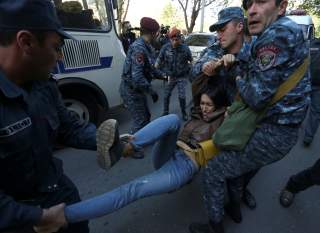Geopolitical Implications Amid Armenia’s Velvet Revolution
Both the political crisis in Armenia and the conflict with Azerbaijan showing no signs of abating.
Most recently, multiple independent reports from as early as April 22 demonstrate Azerbaijan moving massive amounts of manpower and military hardware towards the line of contact that is still ongoing. This means that conflict is still likely and will be ongoing for some time, with both the political crisis in Armenia and the conflict with Azerbaijan showing no signs of abating.
Therefore, the only way to thwart a catastrophe in the region would be for Azerbaijan to receive a clear signal from the West that any involvement with the Kremlin to undo Armenia’s revolution would be unacceptable. Any attempt to force regime change must be seen by the West as another expansion of Russian power and influence in the region. Otherwise, renewed conflict will be guaranteed and the increasing unpredictability will spill over instability throughout the Black Sea-Caucasus region.
Eduard Abrahamyan, PhD, is a defense and regional security analyst, and scientific researcher, at the University of Leicester. His expertise is on NATO’s strategy evolution and adaptation in the Eastern Europe and Black Sea regions.
Movses Ter-Oganesyan is a fellow at the Eurasian Research and Analysis Institute. His area of expertise encompasses the wider Caucasus as well as American foreign policy.

